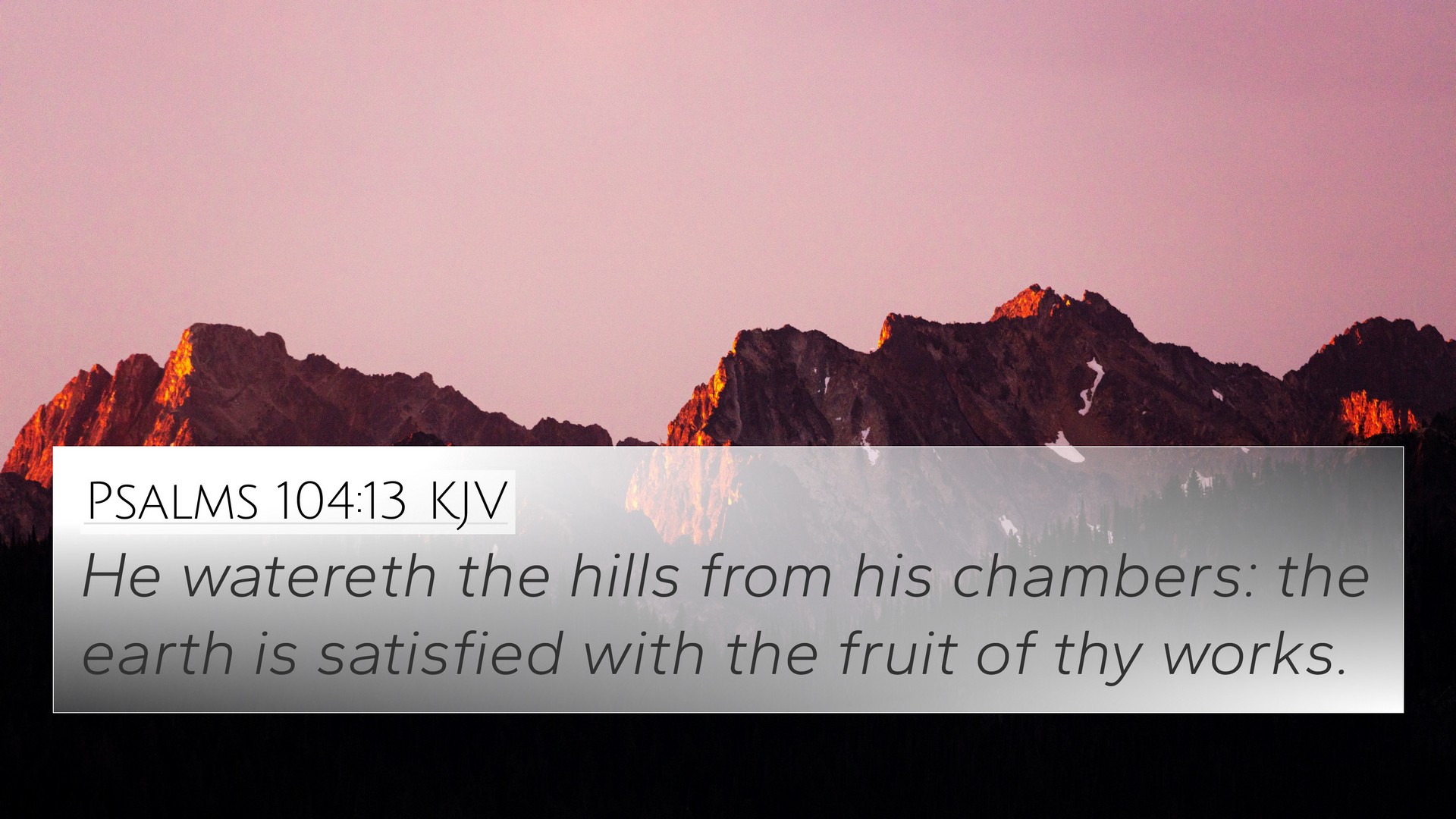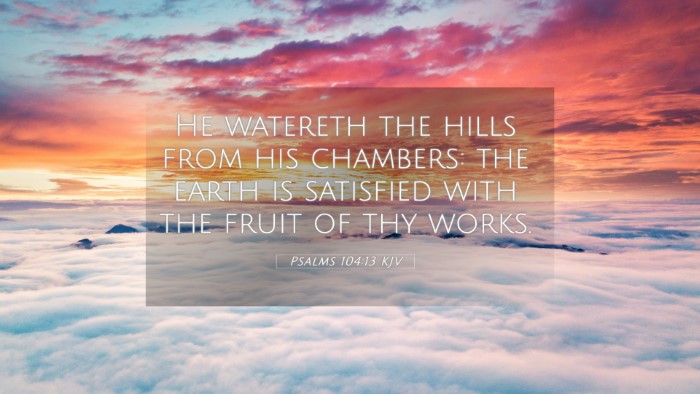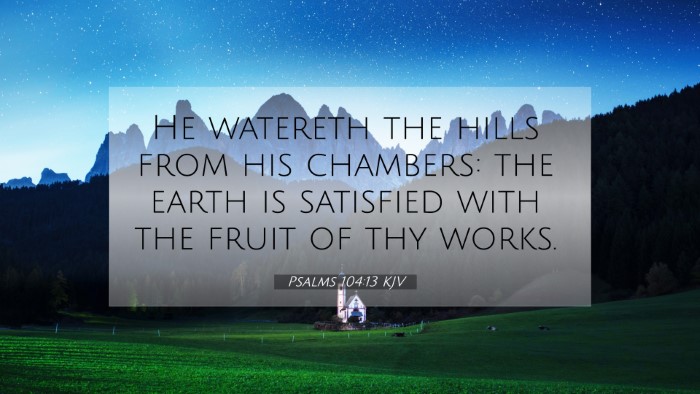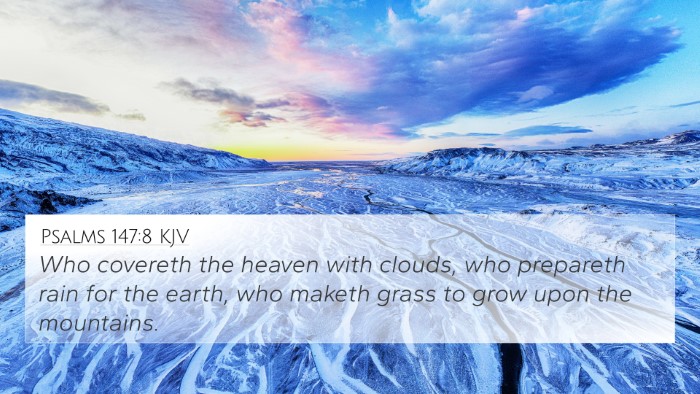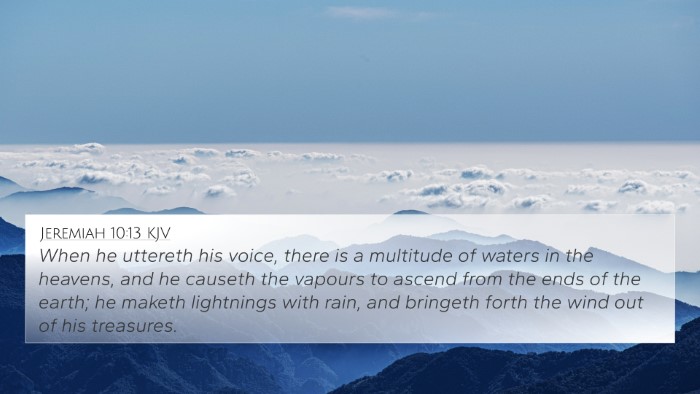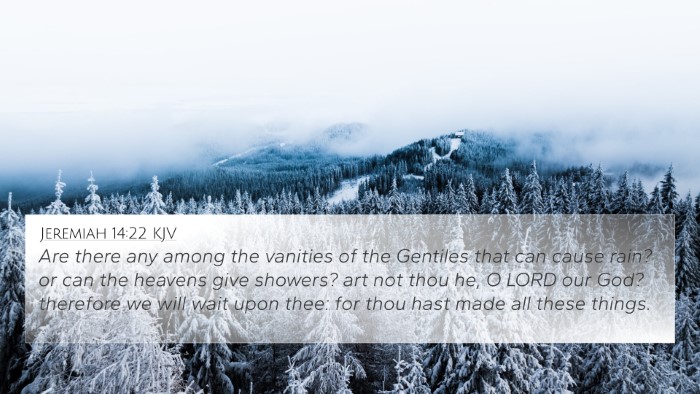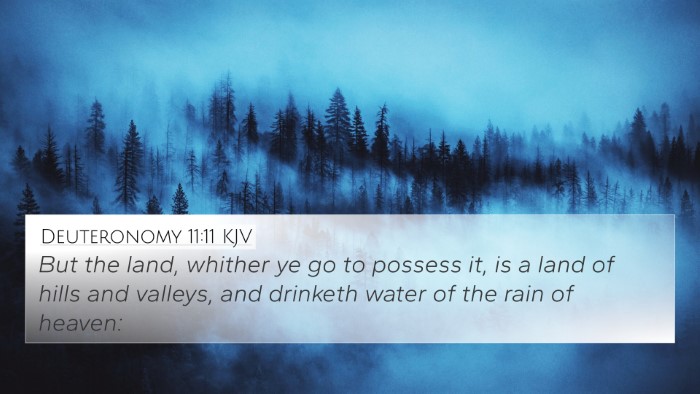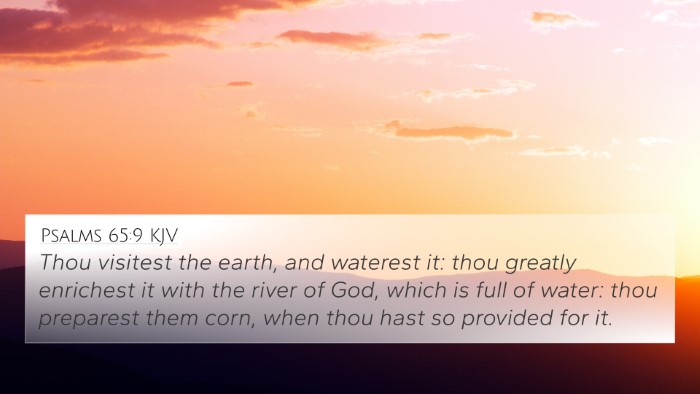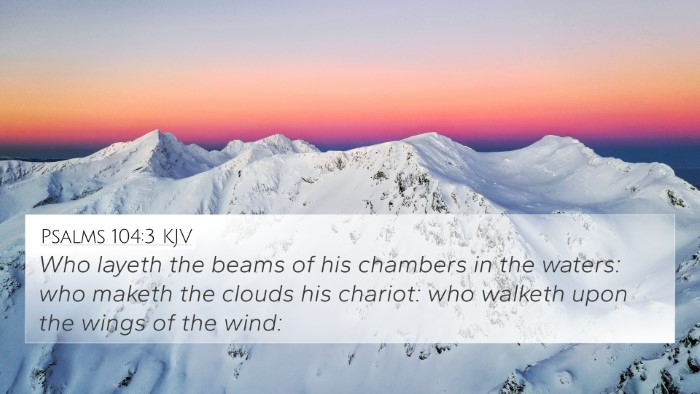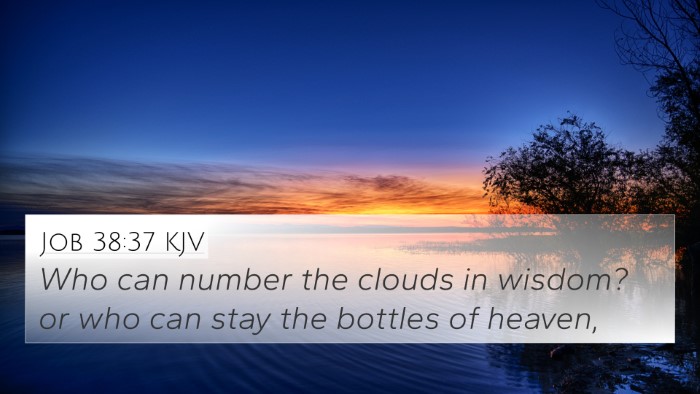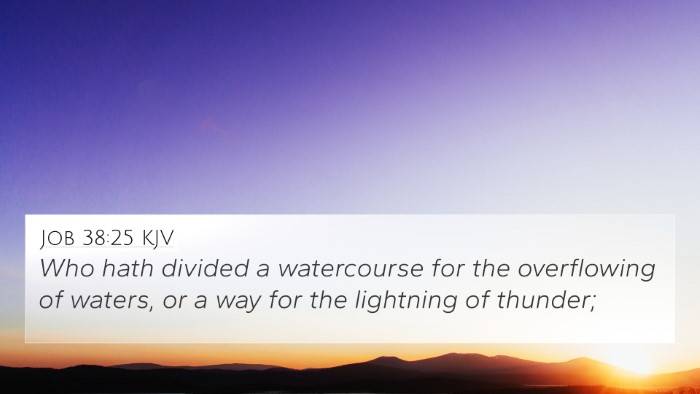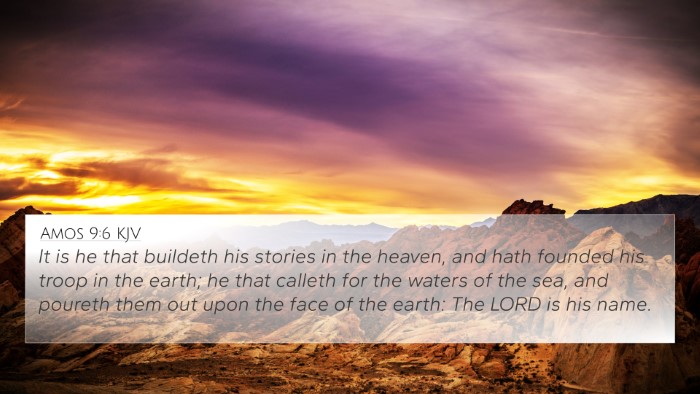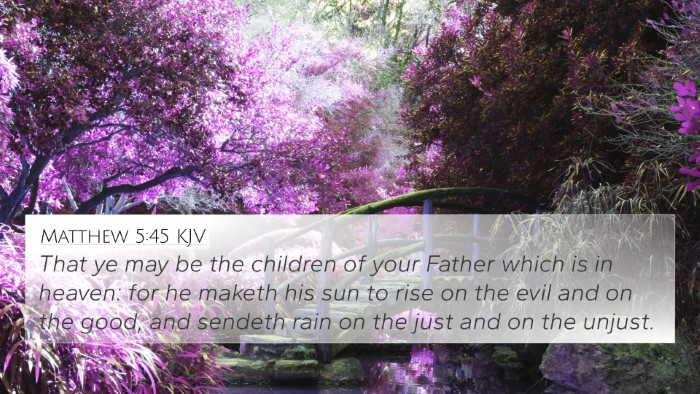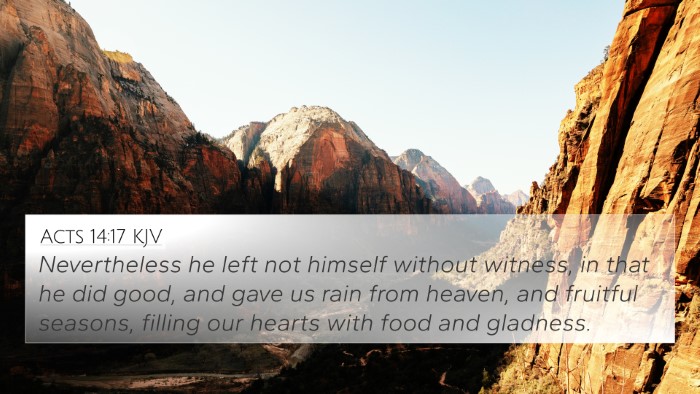Psalms 104:13 - Understanding the Verse
Psalms 104:13 states: "He watereth the hills from his chambers: the earth is satisfied with the fruit of thy works." This verse reflects profound themes of God's providential care and the abundance provided in creation.
Overview of the Verse
This Psalm articulates the beauty and order of God's creation, emphasizing how nature itself is nourished by divine provision. Through this, we recognize the interconnectedness of creation as influenced by the Creator.
Commentary Insights
- Matthew Henry emphasizes the significance of God's sustaining power over nature, indicating how God’s "chambers" refer to the heavens that distribute rain to nourish the earth, demonstrating His care and provision for all creation.
- Albert Barnes elaborates on the idea that the hills receive an abundance of moisture, showcasing God's omnipotent hand ensuring that the land produces fruit—symbolizing both physical sustenance and spiritual nourishment.
- Adam Clarke connects the imagery of water to the Holy Spirit, suggesting that just as the earth is satisfied with water, so are people's souls quenched by the Spirit of God.
Thematic Connections
This verse serves as a basis for understanding key themes in the Bible, including:
- Divine Provision: God’s continual blessing on His creation.
- Nature’s Response: The earth's satisfaction reflects its design to glorify God.
- Spiritual Nourishment: Here, water represents life, paralleling the sustenance found in God’s word.
Bible Verse Cross-References
To deepen our understanding of Psalms 104:13, it helps to explore the following cross-references:
- Genesis 2:6 - "But there went up a mist from the earth, and watered the whole face of the ground." This equates God's provision to the original creation narrative.
- Job 38:26-27 - "To cause it to rain on the earth, where no man is; on the wilderness, wherein there is no man." This emphasizes God’s control over nature.
- Isaiah 55:10-11 - "For as the rain cometh down, and the snow from heaven...so shall my word be that goeth forth out of my mouth..." This connects physical sustenance with spiritual nourishment.
- Matthew 5:45 - "He maketh his sun to rise on the evil and on the good, and sendeth rain on the just and on the unjust." This reflects God's impartial provision.
- James 5:18 - "And he prayed again, and the heaven gave rain, and the earth brought forth her fruit." This highlights the power of prayer in relation to God's provision.
- Psalm 65:9-10 - "Thou visitest the earth, and waterest it...Thou crownest the year with thy goodness, and thy paths drop fatness." A clear parallel of divine providence and abundance.
- Matthew 6:26 - "Behold the fowls of the air: for they sow not, neither do they reap, nor gather into barns; yet your heavenly Father feedeth them." A reminder of God’s care over creation.
- Revelation 21:6 - "I will give unto him that is athirst of the fountain of the water of life freely." This reflects the ultimate spiritual satisfaction that comes from God.
- John 7:38 - "He that believeth on me, as the scripture hath said, out of his belly shall flow rivers of living water." A powerful image of the sustenance provided through faith.
- Psalm 107:35 - "He turneth the wilderness into a standing water, and dry ground into watersprings." This emphasizes transformation and God’s miracle in providing sustenance.
Exploring the Connections Between Bible Verses
Understanding how Psalms 104:13 connects with other scriptures can illuminate its deeper meanings:
- Identifying Connections: The verse shows God's role in not just creation but sustenance throughout the biblical narrative.
- Linking Bible Scriptures: As we explore cross-references, we find a rich tapestry of themes related to God's provision and care for creation.
- Bible Verses That Relate: Verses like Matthew 5:45 reinforce the idea that God cares for all of His creation through equitable distribution of resources.
- Cross-Referencing Psalms: Many Psalms echo themes of nature reflecting God’s glory, aligning with the sentiments expressed in 104:13.
Tools for Bible Cross-Referencing
For a more extensive study, consider how to implement cross-referencing tools in your Bible study:
- Bible Concordance: Utilize a concordance for locating verses related to specific themes, such as divine provision.
- Bible Reference Resources: Resources can provide insights into the links among biblical texts.
- Comprehensive Bible Cross-Reference Materials: Using detailed guides can reveal thematic connections across both Testaments.
- Cross-Reference Bible Study: Engage in studies focusing on inter-Biblical dialogues that shed light on verses like Psalms 104:13.
Conclusion
Psalms 104:13 serves as a vital testament to God's providence and creativity in the natural world. By studying this verse in conjunction with various cross-references and themes, we can gain a deeper appreciation of the divine hand at work in creation and its significance in our spiritual lives.
